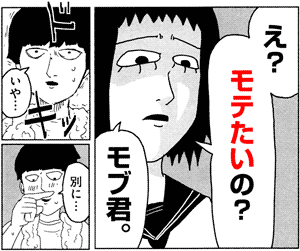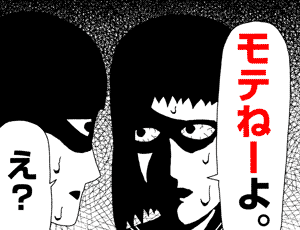In Japanese, moteru モテる means "to be popular," in the sense of a guy being popular with girls, or of a girl being popular with guys. Being romantically popular. Like a bishoujo 美少女, with thousands of admirers, love letters, a boyfriend, and so on.
Not to be confused with: the homonym moteru 持てる, which means "to have" or "to hold" something; or with ninki 人気, which means "popular" in the general sense.
Grammar
Grammatically, moteru works just like any other verb in Japanese.
- kare ga moteru
彼がモテる
He moteru's.
He is popular.
It's particularly used in relative clauses:
- {moteru} otoko
モテる男
A man [that] {moteru's}.
A man [that] {is popular}.
A popular guy.
Men [that] {are popular}. Popular men. (plural.) - {moteru} onna
モテる女
A woman [that] {is popular}. Women [that] {are popular}.
A popular woman. Popular women. - moteru hito
モテる人
A popular person. Popular people.
モテない
The word motenai モテない means "to not be popular." It's the negative form of the verb moteru, with the nai ない suffix. It's often used in reference to hiriajuu 非リア充 characters, e.g. otaku オタク.
- {motenai} hito
モテない人
A person [that] {doesn't moteru}.
A person [that] {isn't popular}.
People [that] {aren't popular}.
This word is probably best known in the west for being part of the full title of WataMote わたモテ:
- watashi ga motenai nowa dou kangaete-mo omae-ra ga warui!
私がモテないのはどう考えてもお前らが悪い!
[As for why] I'm not popular: no matter how [I] think [about] [it], [it's] you [guys] [fault]!- watashi ga motenai
私がモテない
I'm not popular. - nowa
のは
The no の particle is a nominalizer turning the VP watashi ga motenai into a noun.
The wa は particle marks the noun as topic. - dou verb-te-mo
どう〇〇ても
Regardless of how you verb.
No matter how you verb. - omae お前
You. (second person pronoun.) - -ra
~等
Pluralizing suffix. Turns the word into a plural; normally only used with nouns that refer to people. So it makes "you" into "you all," "you guys," etc. - warui
悪い
"Bad." (literally.)
Fault. (for doing something bad.)
- watashi ga motenai
In the series, the protagonist Kuroki Tomoko 黒木智子 does not moteru, that is, she motenai, she's not popular.
Since moteru means to be popular romantically, and, consequently, to end up having a girlfriend, or boyfriend, the verb motenai モテない can sometimes imply you don't have a boyfriend or girlfriend, and it ends up getting translated as such. For example:
- {kimi ga motenai} riyuu wo oshiete agemashouka?
君がモテない理由を教えてあげましょうか?
Should I tell you the reason [why] {you don't have a boyfriend}?
- kimi ga motenai
君がモテない
You aren't popular.
You [don't have a boyfriend]. - riyuu
理由
Reason. - oshieru
教える
To teach. To tell [information]. - ~te-ageru
~てあげる
To do [something] for [someone].
- kimi ga motenai
—Aldnoah Zero アルドノア・ゼロ
For reference, the words for "boyfriend" and "girlfriend" in Japanese are kareshi 彼氏 and kanojo 彼女.
- motenai otoko
モテない男
A man that's not popular. Men that aren't popular.
A man [that doesn't have a girlfriend]. Men [that don't have girlfriends]. - kanojo no inai otoko
彼女のいない男
A man [that] doesn't have a girlfriend. Men without girlfriends. - motenai onna
モテない女
A woman that's not popular. Women that aren't popular. - kareshi no inai onna
彼氏のいない女
A woman [that] doesn't a boyfriend. Women without boyfriends.
モテたい
The word motetai モテたい means "to want to be popular," it's the tai-form of moteru モテる.
- {motetai} hito
モテたい人
Someone [that] {wants to be popular}.
People [that] {want to be popular}. - motetai otoko
モテたい男
A man [that] {wants to be popular}.
Men [that] {want to be popular}. - motetai onna
モテたい女
A woman [that] {wants to be popular}.
Women [that] {want to popular}.
In anime, a lot of characters that are "not popular," motenai, also happen to "want to be popular," motetai. They want girls giving them love letters, bringing hand-made box lunches and stuff. Or maybe they just want a girlfriend.
- e? motetai no? Mob-kun.
え?モテたいの?モブ君。
Eh? [You] want to be popular? Mob-kun. - doki' ドキッ
*thump* (onomatopoeia.) - iya...
いや・・・
No... - betsu ni...
別に・・・
[Not really]...
- motenee yo.
モテねーよ。
[You] won't be popular.- motenee
モテねー - motenai
モテない
To not be popular.
- motenee
- e?
え?
Eh?
- kin'niku wo tsuketemo anta wa motenai.
筋肉を付けてもあんたはモテない。
Even if [you] gain muscle you won't be popular.- kin'niku wo tsukeru
筋肉を付ける
To attach muscle. (literally.)
To gain muscle. (through exercise.)
- kin'niku wo tsukeru
Other conjugations:
- motetakatta
モテたかった
[I] wanted to be popular. (past tai-form.) - motetakunai
モテたくない
[I] don't want to be popular. (negative tai-form.)
モテモテ
The word motemote モテモテ means someone is "very popular," that they moteru very much. More literally, if you imagine one mote as being popular once, motemote is being continuously popular: pumping out that popular aura.
See Reduplication for words like it.
モテ期
The word moteki モテ期 means a period of time in which somebody's popular, literally their "popular season," or "popular period."
A couple of series have been made with this word in the title, and they're all about someone who wasn't popular suddenly becoming popular, entering their moteki, and having characters of the opposite sex interested in dating them.
- Context: the student council president informs someone of a fact.
- moteki
kiteru na
モテ期 来てるな
[Your] popular period... has come, huh.- Yer a popular, Harry!
- kuru
来る
To come. - kiteru
来てる - kite-iru
来ている
To come and be [here].
To have come [here].
- eeeee!!?
えええええ!!?
*internal screaming.*
持てる
The word moteru 持てる means "to be able to hold" something. It's the potential verb derived from motsu 持つ, which means "to hold" or "to have" something.
- kasa wo motsu
傘を持つ
To hold an umbrella. - kasa wo moteru
傘を持てる
To be able to hold an umbrella. - kibou wo motsu
希望を持つ
To have hope. - kibou wo moteru
希望を持てる
To be able to have hope.
It's not to be confused with motteru 持ってる, a contraction of motteiru 持っている, both meaning "to be holding" something or "to be having" something.
See also: i-nuki-kotoba い抜き言葉.
The "to be popular" moteru モテる, which this article is mostly about, is a slang that probably came from this "to have" moteru 持てる.
As you can see, despite being read the same, they're written differently: the popular moteru is written with katakana, while the normal moteru is written with kanji.
人気
The word ninki 人気 means "to be popular" too, but it means popular in general, and not popular romantically. For example:
- ninki manga
人気漫画
A popular manga. (has many readers.)
It can also be used to say a place has nobody in it.
- {ninki no nai} basho
人気のない場所
A place [where] {ninki is nonexistent}.
A place without ninki.
A place without people.
A place where nobody's around.- The ideal place...
- kokuhaku suru
告白する
To confess. (your love, or your crimes, etc.)





Using Mob Psycho 100 as an example. Excellent.
ReplyDeleteIn your Mob example, you used "motenai" which I believe you said to mean unpopular, instead of "motetai". Was this intended?
ReplyDeleteNo, that was a typo. The text read "motetai" but I typed "motenai" as romaji. Thanks for noting. I've updated the article.
Delete